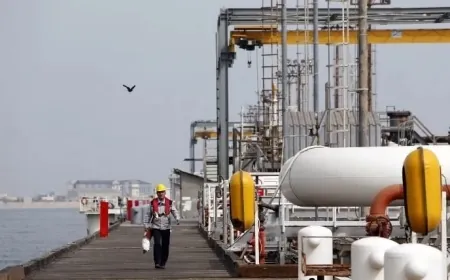Oil Prices Rebound as Israel-Hezbollah Tensions Rise and China Demand Worries Persist
Oil prices rebound as tensions rise between Israel and Hezbollah. Concerns about China’s demand and upcoming OPEC+ meeting continue to impact the market

Oil prices saw a modest rebound on Wednesday after reaching seven-week lows, driven by escalating tensions in the Middle East. Israel's recent military action against Hezbollah has influenced the recovery, although ongoing concerns about China's demand for oil continue to impact the market.
By 0020 GMT, Brent crude futures rose by 39 cents, or 0.5%, to $79.02 per barrel, just before the contract's expiration. The more active October contract increased by 47 cents to $78.54 per barrel. U.S. West Texas Intermediate (WTI) crude futures also saw a rise, climbing 52 cents, or 0.7%, to $75.25 per barrel. Both Brent and WTI had dropped around 1.4% on Tuesday, reaching their lowest levels in seven weeks.
The situation in the Middle East intensified as Israel announced it had killed Hezbollah's senior commander in an airstrike on Beirut. This was in response to a cross-border rocket attack on Israel by Hezbollah on Saturday. Despite efforts by U.S. and UN officials to prevent a broader conflict, tensions remain high.
Despite the recent price increase, Brent and WTI are set to record their largest monthly losses since 2023. The decline in oil prices is partly due to concerns about China's demand outlook, hopes for a ceasefire in Gaza, and expectations that the upcoming OPEC+ meeting will not alter the plan to start easing production cuts from October. IG analyst Tony Sycamore highlighted these points in a recent note.
The Organization of the Petroleum Exporting Countries and its allies, known as OPEC+, will hold an online Joint Ministerial Monitoring Committee (JMMC) meeting on Thursday at 1000 GMT. According to sources, the panel is expected to maintain the current agreement to cut production and begin reducing some cuts in October, despite recent sharp declines in oil prices.
"WTI crude oil remains below the 200-day moving average at $78.66, indicating downside risks towards trendline support in the $74.20/00 area," Sycamore noted. He added that a sustained break below $74 could lead to prices dropping to around $70.
Adding to market pressures is the slowing demand for fuel in China, the world's largest crude oil importer. China is set to release official purchasing managers' index (PMI) data on Wednesday, which is expected to show a decline in factory activity for the third consecutive month in July.
As the market anticipates further developments, the balance between geopolitical tensions and economic indicators will continue to influence oil prices. Investors and analysts will closely monitor the outcomes of the OPEC+ meeting and China's economic data to understand future trends in the oil market.
Also Read: Oil Prices Hit Six-Week Low as Demand Concerns and Middle East Tensions Rise
































































